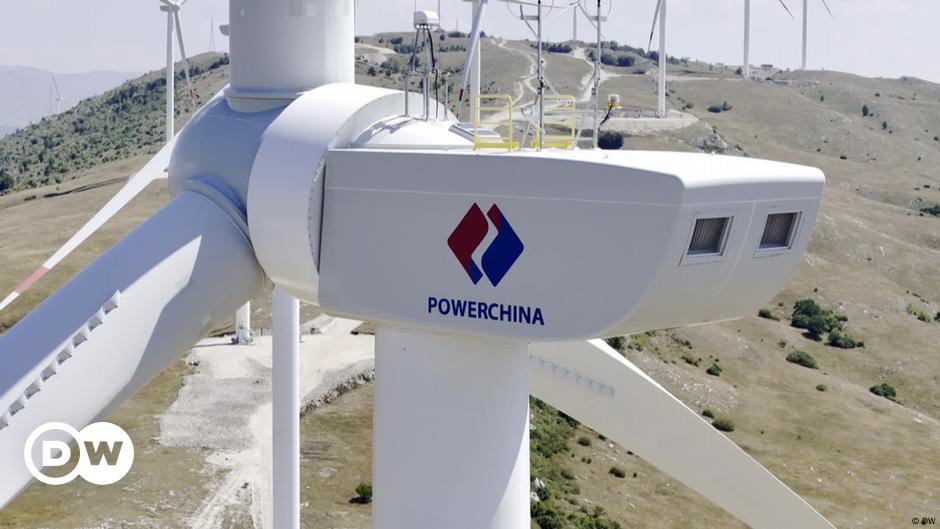Ante Ivkovic herded sheep in Bosnia-Herzegovina with his father as a child. Years later, without his consent or knowledge, he says, a wind farm was built on his property by a Chinese company.
The Chinese wind farm company, headquartered in the capital Sarajevo, declined to comment on camera. In an email, they stated they relied on Bosnian documents that confirmed the concession’s legality and claimed there were no unresolved ownership issues.
Ivkovic, with the help of his lawyer, is pursuing legal action to prove his ownership. His lawyer is gathering evidence from archives to build the case.
[…]
Chinese wind energy companies have been aggressively expanding into the European market, undercutting European competitors by significant margins, thanks to state subsidies. This is evident not only in Bosnia, but also in neighboring Croatia.
[…]
The EU has taken notice. Under Ursula von der Leyen’s leadership, the EU is scrutinizing Chinese wind farms, investigating whether state subsidies are giving them an unfair advantage over European competitors. Lobbyists warn that with every new wind farm, China tightens its grip on Europe’s energy supply.
“On a modern wind turbine there are around 300 sensors on the different components of the turbine, which are giving information to the wind farm owner and operator, and to the turbine manufacturer about the performance. And many people in Europe are saying, ‘do we want to give that power to entities outside of Europe to control the functioning of wind turbines?’,” says Giles Dickson, the CEO of WindEurope.
[…]
Will a retiree be able to assert his rights against a 160-million-euro project? This case will help determine how much property rights are worth in Bosnia and Herzegovina.



This is still seemingly a case of a Chinese business developing on land they don’t own. Even if they do own it, economic expansion into other territories SHOULD worry some people when it comes to the major powers (US included) as it’s been shown they don’t play nice when they have access to your Major resources.
Germany couldn’t give up Russia for Oil, don’t make the Baltic states rely on China for electricity. Subsidize builds in your own country the best you can, but competing with government-backed foreign entities is a good way to lose a bidding war.
Difficult to say what’s exactly happening with the land ownership in this case. Probably the local government fucked over this guy, but not the Chinese.
About economic expansion. We do acknowledge that Capitalism is what makes the world go ‘round, but we don’t want others to be successful with it. Because if you are successful you need new markets. That’s why we want the Chinese to open up their markets for us more, we want Africa to open their markets for us more. If we close everything up, like the US under Trump and the EU under Von der Leyen, we are doing what most countries were doing 100 years ago. Part of which led to whatever we should have learnt by now.
I acknowledge that capitalism is an inherently evil system designed to extract all value from an object, I do not recognize that’s what makes the world go round.
And I’m not saying to close the borders and prevent all foreign trade. But I’m staunchly against any land purchases by foreign entities. China has already shown it’s hand in how it handles international disputes about its purchased land, we’ve seen how they behave in Africa, along the Indian border, their investment and meddling in the housing markets of Australia. You want Lithuania or Poland or Uzbekistan to have some business deals, sure, with regulation have at it. But keep China’s land grabs and the US’s military bases within their borders.
They simply don’t. One necessity of international trade and competition is reciprocity, but in China, foreign companies can’t even establish a subsidiary. They need a Chinese partner who would then own the majority of the joint venture, while the foreigner own a minority stake in the company. And that’s just one issue among many.
In addition, Europe should not replace its dependence on Russian fossil fuels with dependence on Chinese renewable energy technology. That doesn’t make sense.
Depends on the industry sector whether China requires a joint venture or not. Apart from the automotive industry, afaik the sectors in which the Chinese exert control over foreign investment are largely the same ones where the EU or the US exert control over foreign influence. Energy is of course part of that. Bosnia Herzegovina is not inside the EU though.
There are multiple examples of Chinese subsidiaries and/or takeovers of European companies in Europe, but there are no examples of European companies doing the same in China. In no sector. The rules are nowhere the same, not even remotely.
The only Chinese province where completely foreign-owned companies were possible was Xiamen, but that lasted until the 2000s or so (I don’t remember the exact date). Your statements are outright false.
In all what constitutes fair competition, China lacks behind. China is a totally closed shop by any comparable standards with -in addition to that- grave human rights issues in the country, and the situation has been worsening in recent years.
China is in the process of opening up to foreign investment. A new law in 2020 set foreign companies on par with domestic ones in many industries. As I understand it, subsidiaries can be completely foreign owned. They have to register of course.
https://www.pinsentmasons.com/out-law/guides/doing-business-in-china-part-2---establishing-a-business-in-china